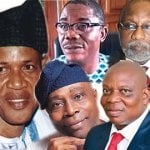Mr. Lee Kuan Yew (1923-2015) was the first Prime Minister of Singapore and he governed his country from 1959-1990. In January 1966, he visited Nigeria as part of the Commonwealth delegation to discuss Rhodesia unilateral declarations of independence. Rhodesia is now called Zimbabwe. He stayed in Lagos, like all the Commonwealth leaders for three days. It was after their departure that Nigeria’s Prime Minister, Alhaji Tafawa Balewa, was assassinated. His views on Nigeria was published in 2000 in a 729-page book titled: From Third World To First,’ which I am sure many Nigerians have read.
On page 352 of that book, he described Nigerians as ‘different people playing to a different set of rules.’ On page 357 of that same book, he said Nigeria’s ‘tribal loyalties were stronger than their sense of common nationhood.’ To most of us, Mr. Yew’s verdict on Nigeria is nothing new. This month is the 50th year anniversary of the Ad-Hoc Constitutional Conference in Nigeria. The conference was summoned by the then Lt-Col. Yakubu Gowon less than 65 days after he took over power. The conference met between September 12 and 28, and again between October 28 and November 4, 1966. At that time, there were four regions in Nigeria, mainly North, Mid-Western, West and Eastern Region. No delegation from the East attended the second session of the conference because of the political situation at that time. Sixteen major issues were discussed at that conference. They were — Form of government and component units, Head of State, central government, central legislature, judiciary, central civil service, finance (power to raise revenue, the allocation of revenue and national debt), defence, police, external affairs, immigration and emigration, banking, currency, monetary policy, external loans, transport and communications, higher education, concurrent powers and planning(including the equitable distributions of capital investment).
The following were proposals of each region as it affects the form of government and component unit:
EAST: An association of the existing Regions, with a right to secede. Opposed to the creation of new states on three grounds: (a) inadequate time: will involve a long-drawn-out process of inquiries, commissions and plebiscites, taking up many months or even some years which we cannot afford under the present crises (b) entails a strong central government: not in the interest of harmony and peace of the country to have a strong central government. The splitting up of the country into new states will automatically have the effect of transferring functions which the smaller states cannot be expected to execute with their limited resources.
MID-WEST: A federation of the existing region, Lagos continuing as Federal Territory or becoming a Region. The memorandum considered a redrawing of the constituent units desirable and set out the following criteria: ethnic, linguistic, and cultural affinity or homogeneity, historical association (e.g. Hausa/Fulani, Efik/Ibibio), viability of states both absolutely and relatively, geographical contiguity, comparability in size, reciprocal self-determination (i.e. not only should each minority group be given the opportunity to determine its future but also a majority group must be given the opportunity to determine whether it is willing to associate with a minority seeking such association.
NORTH: (i) Original proposal. A union or association of the existing regions, and such other states as may be formed subsequently’, with a ‘right to secede completely and unilateral.’
The ‘right of self-determination of all people in the country must be accepted and a referendum or plebiscite shall be the method through which the wishes of the people concerned shall be ascertained. These rights include the right of any State within the country to secede. But the implementation of these principles shall not delay the determination of the future of Nigeria. All necessary guarantees shall, however, be written in the future constitution to establish the right of self-determination by any section.’
(ii) Revised proposal. A Federation with an ‘effective Federal government. The above-mentioned method of creating new states was to be ‘discussed and formally adopted’.’ Grave doubts about the wisdom of creating states based on “ethnic and linguistic affinities”. In any arrangement based on this principle, there are bound to be large numbers of small pockets of minor ethnic and linguistic groups who will necessarily find themselves grouped uncomfortably with the larger and dominant ethnic groups.
WEST: (i) Original proposal.
First alternative: A Federation with ‘the immediate creation of more States (including a Lagos State) based on ethnic and linguistic affinities, account being taken also of territorial contiguity and economic viability’. Also ‘clear-cut and less cumbersome provision for the creation of additional states in the future under conditions which should be clearly set out in the Constitution’.
Second alternative: A ‘Commonwealth comprising the existing Regions and such other Regions as may be consequently created, with Lagos forming part of the present Western Nigeria’. Each State should have a right unilaterally to secede… at any time of its own choice.’
(ii) Revised proposal. A Federation; ’the creation of more States (including a Lagos State) based on ethnic and linguistic affinities, account being taken also of territorial contiguity and economic viability’ was’ strongly recommended’. ’In the event of states not being created, Lagos shall form part of the Western Region.’
On November 30, 1966, Lt. Col. Gowon adjourned the conference and disclosed that ’they had run into difficulties, which made it impossible for them to meet.’
It was the failure of the conference that led to the Aburi meeting in Ghana.
Dr. Mudiaga Oje told me in 1977 that if the Ad-Hoc Conference had succeeded, the civil war could have been avoided. Suffice it to say that the issues raised at that conference are still relevant till today.
- Teniola is a former director at The Presidency.
WATCH TOP VIDEOS FROM NIGERIAN TRIBUNE TV
- Let’s Talk About SELF-AWARENESS
- Is Your Confidence Mistaken for Pride? Let’s talk about it
- Is Etiquette About Perfection…Or Just Not Being Rude?
- Top Psychologist Reveal 3 Signs You’re Struggling With Imposter Syndrome
- Do You Pick Up Work-Related Calls at Midnight or Never? Let’s Talk About Boundaries





